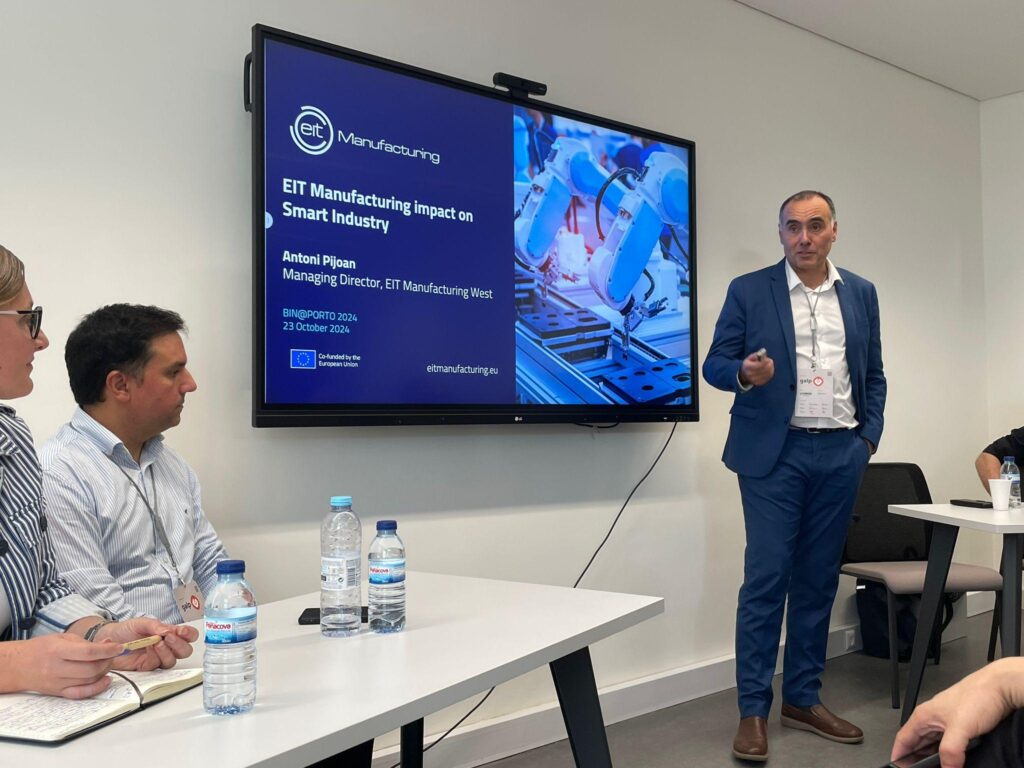Smart shift in manufacturing
The manufacturing industry is undergoing a significant transformation driven by the integration of advanced technologies such as AI, IoT and cloud and quantum computing. These innovations are revolutionising production processes and are playing a pivotal role in shaping what is known as Smart Industry.
The concept integrates machines, devices and systems for real-time data collection and analysis, enhancing productivity, efficiency and decision-making. While this technological synergy offers a competitive advantage, it also presents challenges that organisations must address.
Key Insights from BIN@PORTO
In this context, a focused Action Tank was held during BIN@PORTO, organised by FEUP and UPTEC as part of the annual event of the Business and Innovation Network – BIN@. This event brought together industry leaders, including Brigita Jurisic from the International Iberian Nanotechnology Laboratory, Miguel Ribeiro from Smartex, Leonardo Dicker from XR.Lab and Antoni Pijoan from EIT Manufacturing West. Moderated by Gil Gonçalves from FEUP, the session provided a hands-on platform to tackle pressing challenges within the smart industry landscape.
Key takeaways from the session highlighted the transformative potential of it. This approach offers numerous benefits, including increased efficiency, lower operational costs, improved product quality and greener practices. However, it also presents challenges, such as the need for technology development and adoption, workforce upskilling and effective management of the transition to a more automated and sustainable environment.

Antoni Pijoan contributing to the Smart Industry Action Tank at BIN@PORTO.
EIT Manufacturing boosts Smart Industry
At the forefront of this revolution is EIT Manufacturing, dedicated to driving innovation and transformation within the manufacturing sector. By leveraging cutting-edge technologies and fostering collaborative ecosystems, it enables manufacturers to improve productivity, sustainability and competitiveness.
Our approach involves four key elements. To begin with, we foster a collaborative ecosystem of partners from industry, academia and research institutions to drive innovation. Additionally, we accelerate the adoption of advanced technologies—such as automation, IoT, and data analytics—within manufacturing. This is done through regular open collaborative programmes and supported services. We also focus on investing in upskilling and reskilling initiatives to build a highly skilled workforce for the smart industry. Lastly, we prioritise the development of sustainable manufacturing processes and technologies to reduce the environmental impact.
Antoni Pijoan, Managing Director, EIT Manufacturing West
Driving digital transformation
In this rapidly evolving landscape, EIT Manufacturing helps manufacturers leverage data analytics for process optimisation, waste reduction and improved decision-making. By integrating advanced robotics and automation technologies, organisations can enhance productivity and real-time monitoring. Furthermore, the incorporation of AI further optimises production processes, predicts maintenance needs and strengths decision-making capabilities.
Building the workforce for the future
A significant challenge facing the Smart Industry is the talent gap. The advanced technologies that are shaping this industry require a skilled workforce to operate and maintain them. Recognising this, EIT Manufacturing invests in upskilling and reskilling initiatives. Collaborating with educational institutions, the organisation nurtures the next generation of manufacturing professionals and fosters a culture of continuous learning to keep pace with evolving industry demands.
The allocation of tasks between humans and machines looks set to change. As processes and tasks become more automated and greener, the knowledge and skills in manufacturing operations become obsolete. To thrive in this new environment, both soft skills—problem-solving, self-management, and working with people—and technological skills—related to statistical and computational mindset and industry 4.0 technologies and automation solutions—will be essential.
Gil Gonçalves, Assistant Professor at FEUP and researcher at SYSTEC
Fostering collaborative ecosystems
EIT Manufacturing partners with leading manufacturers, technology providers and research institutions to drive innovation across the industry. By facilitating the sharing of best practices and technical expertise among its network of partners, the organisation fosters a collaborative environment that encourages the flow of ideas and the development of innovative solutions.
Accelerating adoption
To further drive innovation, EIT Manufacturing accelerates the adoption of advanced technologies through pilot projects that validate new solutions, demonstration facilities showcasing the latest advancements and initiatives that enable the transfer of innovative technologies from research labs to manufacturing enterprises.
Driving sustainability
Sustainability is another priority for the organisation, which advocates for circular economy principles and promotes the use of energy-efficient technologies to reduce the environmental impact of manufacturing processes. By encouraging environmentally conscious decision-making, EIT Manufacturing helps companies reduce their carbon footprint and overall impact.
Supporting SMEs in the transition to Smart Industry
Small and medium-sized enterprises are vital to the manufacturing ecosystem. EIT Manufacturing is committed to supporting these businesses by providing access to advanced technologies, capacity-building initiatives and integration into collaborative networks.

